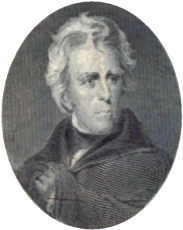‘Bloody Bloody Andrew Jackson’
By Steven Newcomb
From an American Indian perspective, however, “Bloody Bloody Andrew Jackson” is a racist and dehumanizing portrayal of American Indians. It is an effort to be humorous by using and reinforcing the worst stereotypes of American Indians, and working them to great effect and laughter among the non-Indian audience. It does so by evoking the false images of Indian people that continue to permeate the mass culture of American society.
At the outset, the play portrays Jackson as a child, witnessing and experiencing his parents being killed by Indians (shot in the back with arrows). Thus, Jackson is immediately cast as a sympathetic figure in the eyes of the audience, while the Indians are framed as cold-blooded killers.
Historically, however, Jackson’s father, Andrew Jackson Sr., injured himself while lifting a log and died in 1767, at the age of 29, a month before Jackson was born. His mother also was not killed by Indians; she died of cholera while tending to wounded soldiers in the Revolutionary War. Clearly, historical accuracy was the last thing on the mind of the writers.
“Bloody Bloody Andrew Jackson” is said to be an effort to greatly entertain while drawing parallels between Jackson’s era and what’s going on today, with issues of populism, banking, the Washington elite, taxation and terrorism. In keeping with the last analogy, however, this means that the ones being associated with the issues of “terrorists” and “terrorism” are the Indians on the “frontier” who were attempting to defend their traditional lands and territories from American colonization. Jackson’s militaristic and bloody actions were his means of attempting to grow “the homeland” of the United States.
The play makes no effort to accurately contextualize what Indian nations and peoples were facing during Jackson’s era, and the script refers repeatedly to Jackson wanting to get the land “back” from the Indians. As if the Indians had taken it away from the whites to begin with, and Jackson was trying to win it back.
In another effort to be funny, the writers have “Indian” warriors (white cast members) dancing across the stage in drag, to illustrate what exactly is never made clear. Andrew Jackson captures an Indian infant as “a souvenir” of battle, and takes the child home to his wife Rachel. Later the boy comes on stage dressed in the ridiculous stereotypical attire that non-Indians associate with Indian people, and in another effort at humor Jackson mildly reprimands the child for a pastime of “scalping squirrels,” which would not meet with Rachel’s approval.
The play dehumanizes the Indian characters by characterizing them as stupid, and willing to sell their lands for a few blankets so long as you throw in some “dream catchers.” Having white actors in black face would be the equivalent of what Timbers and Friedman have done to American Indians in “Bloody Bloody Andrew Jackson.”
And...wow. The non-Indian reviewer totally ignored its anti-Indian bias.
I guess he was thinking like a typical Dudeson. Namely, if it's a minstrel-like show that claims to be satirizing something, it's okay to stereotype Indians. Never mind that none of the offensive portrayals actually challenge our preexisting notions about Indians.
This is what you get when you don't think critically about the issues: a play that influences thousands of New York City's cognoscenti. How many of these intellectuals and taste-makers went away thinking, "That play's portrayal of Indians was wrong"? And how many went away thinking, "Indians as chiefs, warriors, scalpers, killers...yeah"?
For more on the subject, see Native Plays and Other Stage Shows.


http://www.nytimes.com/2010/07/16/theater/16arts-ANDREWJACKSO_BRF.html?_r=3
ReplyDelete‘Andrew Jackson’ to Move to Broadway in the Fall
Though he was better known as a fierce foe of American Indians and the Second Bank of the United States than a lover of the theater, Andrew Jackson is finally headed to Broadway. After weeks of rumbling, the Public Theater announced on Thursday that there would be a Broadway transfer of “Bloody Bloody Andrew Jackson,” the hit satirical emo-rock musical about the seventh president that ran previously at the Public’s LAB and main stage.